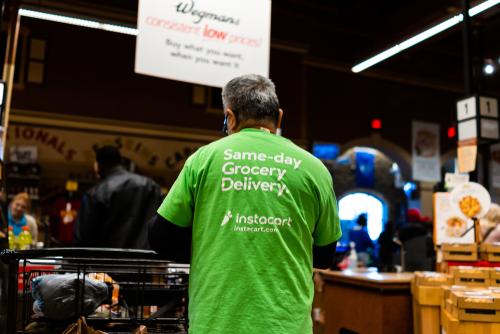Instacart Launches First Government-Funded Grocery Delivery Initiative in Maryland

New Initiative in Montgomery County Supports Food Insecure Families with Instacart
In a groundbreaking move to combat food insecurity, nearly 600 families with over 1,000 children across Montgomery County, Maryland, have recently started to benefit from Instacart Health Fresh Funds. This innovative initiative represents a significant collaboration between local government and a leading grocery delivery service, aimed at bettering the lives of families facing food hardships.
Given the growing concern surrounding childhood hunger, community leaders, grocery providers, and organizations have been working tirelessly to improve food security. Last week, Instacart proudly announced its partnership with Montgomery County to introduce the nation’s first local government grocery delivery program designed to support families struggling with food insecurity.
Introducing the MC Groceries Program
The newly minted MC Groceries program leverages Instacart Health Fresh Funds to deliver monthly online grocery shopping stipends directly to food-insecure families in Montgomery County. Each participating family is set to receive 0 per child each month, providing them with the flexibility to shop for essential groceries online. The program aims to simplify access to food supplies, allowing families to select items from an extensive range of local stores available via the Instacart platform.
Notably, these funds cover a full year, enabling families to purchase a variety of food items, which include pantry staples, fresh produce, frozen goods, dairy products, and meat. This approach not only alleviates the financial strain faced by these families but also empowers them to make nutritional choices tailored to their needs and preferences.
Expanding Access to Healthy Foods
Instacart reports that over 80 local stores participate in this program and provide delivery and pick-up options through its platform. This level of accessibility is crucial, particularly for families who may struggle to access fresh food options due to transportation or economic barriers. By partnering with local grocers, the program ensures that participants can obtain fresh, nutritious food even amid financial limitations, thereby supporting healthier diets for children and families alike.
To qualify for the MC Groceries program, families must meet specific criteria. This includes having at least one child under the age of 18 and a household income at or below 400% of the federal poverty level. Additionally, eligibility requires that the household does not currently receive benefits from the federal Supplemental Nutrition Assistance Program (SNAP). This policy recognizes families who may not qualify for federal aid but still face significant challenges in accessing food.
The Growing Need for Food Security Solutions
The urgency of addressing food insecurity cannot be overstated, especially in light of the ongoing effects of the COVID-19 pandemic, which have exacerbated existing challenges for many families. Reports indicate that food insecurity has been on the rise across various demographics, and children are particularly vulnerable during times of crisis.
Programs like MC Groceries are critical to mitigating these issues and ensuring that families have consistent access to nutritious food options. They serve as a model for similar initiatives nationwide, showcasing how collaborations between local governments and private-sector entities can lead to impactful solutions.
A Community-Centric Approach
Community leaders and activists have embraced the MC Groceries initiative as a vital step towards eradicating hunger in the area. They argue that such efforts go beyond just providing food; they foster a sense of stability for families, allowing them to focus on other aspects of life, such as education and employment, without the overwhelming stress of food scarcity.
As the pilot phase of the MC Groceries program continues, there will undoubtedly be valuable insights collected regarding the effectiveness of grocery stipends in alleviating food insecurity. The success of this program could pave the way for its expansion, not only in Montgomery County but also across other regions grappling with similar challenges.
In summary, the collaboration between Instacart and Montgomery County signifies a thoughtful investment in the well-being of local families. By addressing food insecurity head-on, it is contributing to healthier communities and offering a glimpses into a future where access to nutritious food is a right, rather than a privilege. As more families join this program, we may soon see lasting impacts on their health and overall quality of life, making it a true model for other regions to consider.





